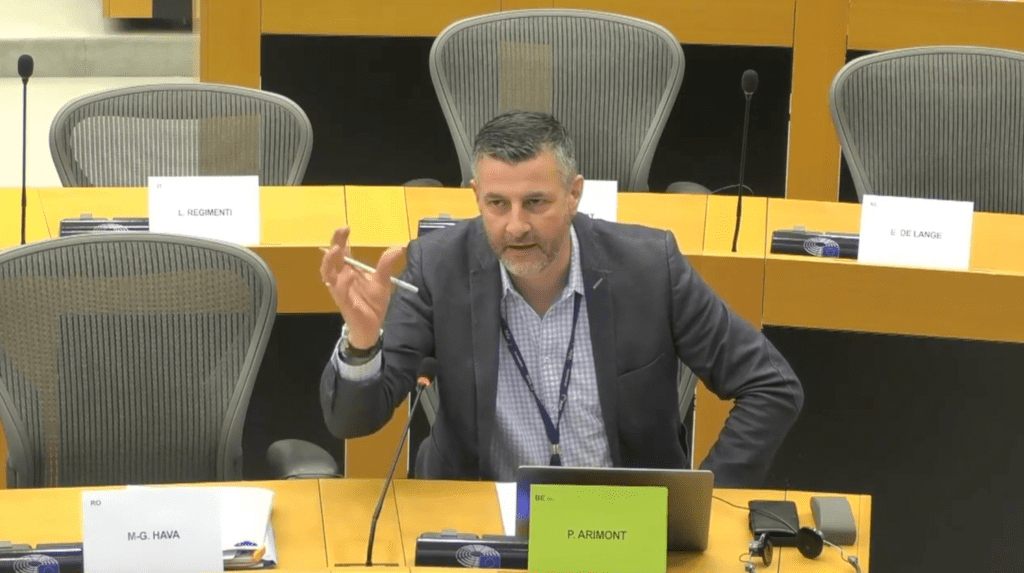On 9 March, a workshop on Long Covid was held in the European parliament. Various invited experts and Members of Parliament highlighted a link between ME/CFS and Long Covid.

In February, the European Parliament’s Special Committee on COVID-19 (the COVI Committee) published a draft report on lessons learned from the pandemic and recommendations for the future. Although the report is 39 pages long, it mentions Long Covid only briefly. Myalgic encephalomyelitis/chronic fatigue syndrome (ME/CFS) is not mentioned at all, despite scientists highlighting the similarities between both conditions.
On 8 and 9 March two workshops were held in the European Parliament to discuss these topics more closely. The first day addressed the EU’s crisis preparedness and response system to the pandemic, while the second workshop focused on the topic of Long Covid.
Several of the invited experts such as Prof. Dr. Peter Piot (London School of Hygiene & Tropical Medicine) highlighted the similarity between ME/CFS and Long Covid. Prof. Dr. Clara Lehmann (German Center for Infection Research, University of Cologne) explained that post-infectious conditions have thus far been poorly recognized and understudied. During the workshop, there was also a consensus among experts that Long Covid should not be seen as a psychosomatic ailment. The slides of Prof. Dr. Dominique Salmon (University Paris Descartes), for example, stressed that it is essential that Long Covid is recognized as a severe somatic (and non-psychosomatic) disease. Piot mentioned that while vaccination reduces the risk of Long Covid, it does so only partially.
Prof. Dr. Carmen Scheibenbogen (Berlin Charité Hospital) focused her presentation on ME/CFS after COVID-19. Her preliminary research indicated that ME/CFS prevalence is increased following Sars-Cov-2 infection. With one powerful graph, Scheibenbogen demonstrated the current poor state of medical care for ME/CFS patients. The graph showed the similarity between ME/CFS and multiple sclerosis (MS) in prevalence, age of onset, and impact on quality of life. But while there are 217 specialist clinics for MS in Germany, there are only 2 for ME/CFS. While there are 16 licensed drugs for MS, there are none for ME/CFS. Scheibenbogen said that the situation for ME/CFS is very difficult, not just in Germany, but across Europe. She explained that this is the result of ME/CFS long being misdiagnosed and misunderstood as a psychiatric disease.
Lastly, Ann Li made a presentation on behalf of the patient organization Long Covid Europe. She asked not to politicize Long Covid, stating: “It’s not a game for us.” Li explained that some family members are not speaking to patients because they do not think the illness is real. She called for a global awareness campaign on Long Covid and asked to involve patients in research and clinical care. Li said: “We are more than just sick people; we have our talents and we have certain expertise and we are calling on everybody to please make use of that expertise…” Long Covid Europe asked to recognize Long Covid as an (occupational) disease for disability benefits and early pension and to invest 500 million in biomedical research on Long Covid.
During the workshops, Members of the European Parliament (MEPs) had the possibility to ask questions. Radan Kanev (EPP, Bulgaria) was the first to enquire about the interplay between ME/CFS and Long Covid. Kanev explained that a lot of work has been done in the European parliament before the pandemic on the topic of ME/CFS and that this may be relevant for Long Covid patients today. Karsten Lucke (S&D, Germany) added that more research is needed on post-infectious syndromes so that we can determine who is at risk to remain ill after an infection. He stressed that it is necessary to add a section on ME/CFS to the COVI report.
Pascal Arimont (EPP, Belgium) also made a powerful intervention. He said that the European resolution on ME/CFS received too little follow-up. While it is positive that the Commission included a call on under-researched high-burden conditions in the Horizon Europe work program, the funding amount is insufficient. According to Arimont, Europe needs to provide more funding for ME/CFS research as this may have useful effects for patients with Long Covid as well, and vice versa. He ended his talk saying: “Diese Menschen verdienen Beachtung, sie verdienen Hilfe und ich glaube das Europäische Parlament soll Ihnen diese Hilfe geben.“ (Translation: “These people deserve our attention, they deserve help and I believe the European Parliament should give them this help”).
Watch the intervention of Pascal Arimont here (in German):